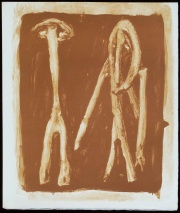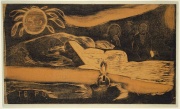Difference between revisions of "Ocher"
(username removed) |
(username removed) |
||
| Line 2: | Line 2: | ||
== Description == | == Description == | ||
| − | Any of several naturally occurring earth pigments containing [http://cameo.mfa.org/materials/fullrecord.asp?name=clay clay] and [http://cameo.mfa.org/materials/fullrecord.asp?name=ferric | + | Any of several naturally occurring earth pigments containing [http://cameo.mfa.org/materials/fullrecord.asp?name=clay clay] and [http://cameo.mfa.org/materials/fullrecord.asp?name=ferric%20oxide iron oxide]. Ochers range in color from pale yellow to orange to deep red. The yellow and brown colors are produced from hydrated iron oxide and the reds from anhydrous iron oxide. [http://cameo.mfa.org/materials/fullrecord.asp?name=yellow%20ocher Yellow ocher] can also be calcined at 550-600 C to form [http://cameo.mfa.org/materials/fullrecord.asp?name=red%20ocher red ocher]. Depending on their originating location, ochers can contain small amounts of [http://cameo.mfa.org/materials/fullrecord.asp?name=sand sand], [http://cameo.mfa.org/materials/fullrecord.asp?name=chalk chalk], [http://cameo.mfa.org/materials/fullrecord.asp?name=gypsum gypsum], [http://cameo.mfa.org/materials/fullrecord.asp?name=barite barite], and silicates that produce variations in color and tinting strength. All ochers, however, are very durable, inert, and lightfast. They have been used since ancient times as permanent pigments in all types of paint media. They are also used as colorants in ceramic slips and glazes. Ocher is often added as a reducing agent in luster glazes. |
[[File:60.318-SC15647.jpg|thumb|]] | [[File:60.318-SC15647.jpg|thumb|]] | ||
| Line 20: | Line 20: | ||
== Authority == | == Authority == | ||
| − | * | + | * R. J. Gettens, G.L. Stout, ''Painting Materials, A Short Encyclopaedia'', Dover Publications, New York, 1966 Comment: density = 2.9-4.0 and ref. index = [2.0-isolated particles] 2.05-2.31; 2.08-2.40; ) |
| − | * | + | * G.S.Brady, ''Materials Handbook'', McGraw-Hill Book Co., New York, 1971 Comment: p. 557 |
| − | * | + | * Ralph Mayer, ''A Dictionary of Art Terms and Techniques'', Harper and Row Publishers, New York, 1969 (also 1945 printing) |
| − | * | + | * R.D. Harley, ''Artists' Pigments c. 1600-1835'', Butterworth Scientific, London, 1982 |
| − | * | + | * Random House, ''Webster's Encyclopedic Unabridged Dictionary of the English Language'', Grammercy Book, New York, 1997 |
* ''The American Heritage Dictionary'' or ''Encarta'', via Microsoft Bookshelf 98, Microsoft Corp., 1998 | * ''The American Heritage Dictionary'' or ''Encarta'', via Microsoft Bookshelf 98, Microsoft Corp., 1998 | ||
Revision as of 06:50, 24 July 2013
Description
Any of several naturally occurring earth pigments containing clay and iron oxide. Ochers range in color from pale yellow to orange to deep red. The yellow and brown colors are produced from hydrated iron oxide and the reds from anhydrous iron oxide. Yellow ocher can also be calcined at 550-600 C to form red ocher. Depending on their originating location, ochers can contain small amounts of sand, chalk, gypsum, barite, and silicates that produce variations in color and tinting strength. All ochers, however, are very durable, inert, and lightfast. They have been used since ancient times as permanent pigments in all types of paint media. They are also used as colorants in ceramic slips and glazes. Ocher is often added as a reducing agent in luster glazes.
Synonyms and Related Terms
haematite; limonite; ochre (Br.); ocre (Fr., Port.); Examples include: golden ochre; English ocher; Roman ochre; sienna; oro de ocre; Oxford ochre; terra di pozzuoli; terra rosa; red chalk; bole; red iron ore; iron oxide red; bolus; sinopia; rubica; ruddle; Venetian red; Indian red; light red
| Density | 2.9-4.0 |
|---|---|
| Refractive Index | 2.05-2.31; 2.08-2.40 |
Authority
- R. J. Gettens, G.L. Stout, Painting Materials, A Short Encyclopaedia, Dover Publications, New York, 1966 Comment: density = 2.9-4.0 and ref. index = [2.0-isolated particles] 2.05-2.31; 2.08-2.40; )
- G.S.Brady, Materials Handbook, McGraw-Hill Book Co., New York, 1971 Comment: p. 557
- Ralph Mayer, A Dictionary of Art Terms and Techniques, Harper and Row Publishers, New York, 1969 (also 1945 printing)
- R.D. Harley, Artists' Pigments c. 1600-1835, Butterworth Scientific, London, 1982
- Random House, Webster's Encyclopedic Unabridged Dictionary of the English Language, Grammercy Book, New York, 1997
- The American Heritage Dictionary or Encarta, via Microsoft Bookshelf 98, Microsoft Corp., 1998
- CRC Handbook of Chemistry and Physics, Robert Weast (ed.), CRC Press, Boca Raton, Florida, v. 61, 1980 Comment: density=3.5

